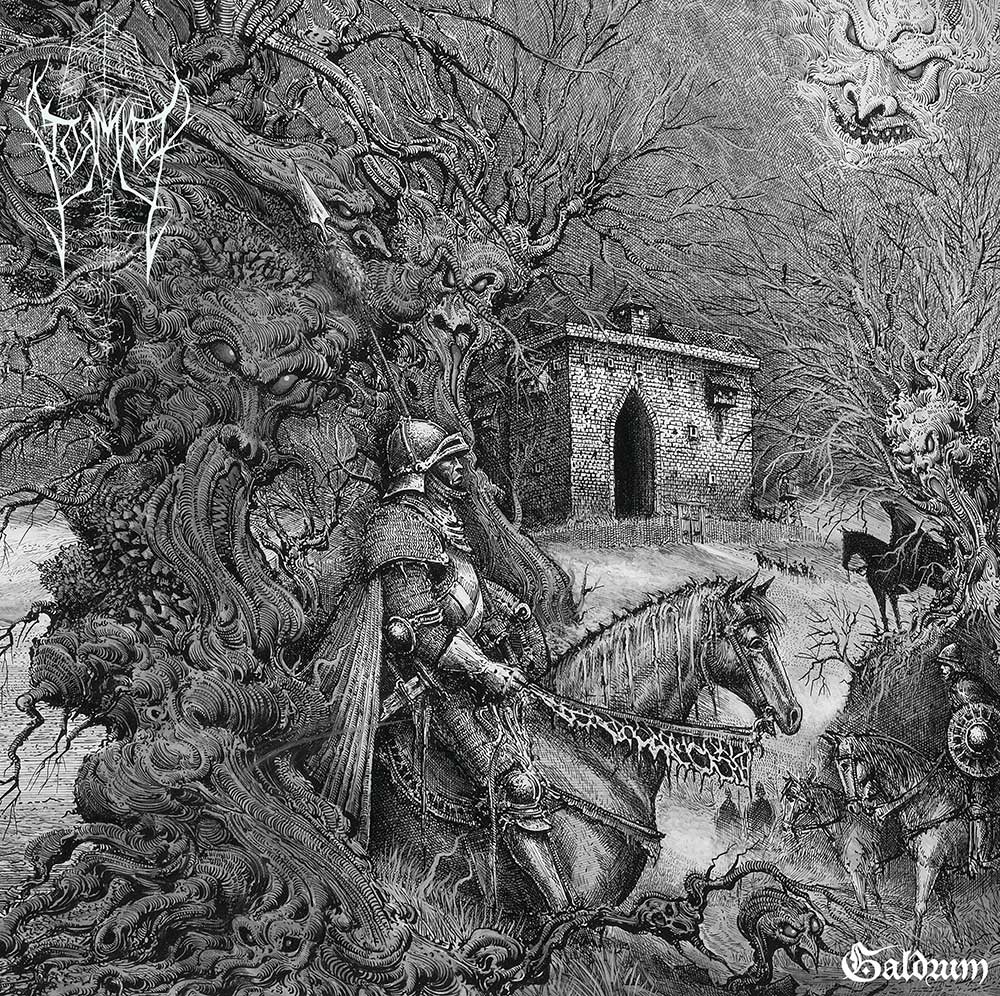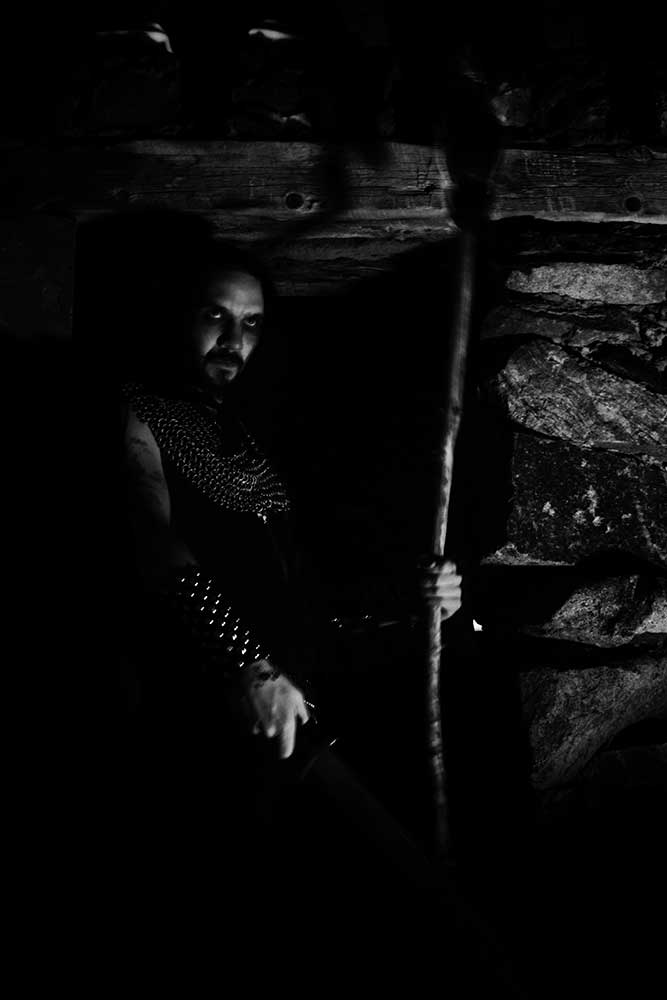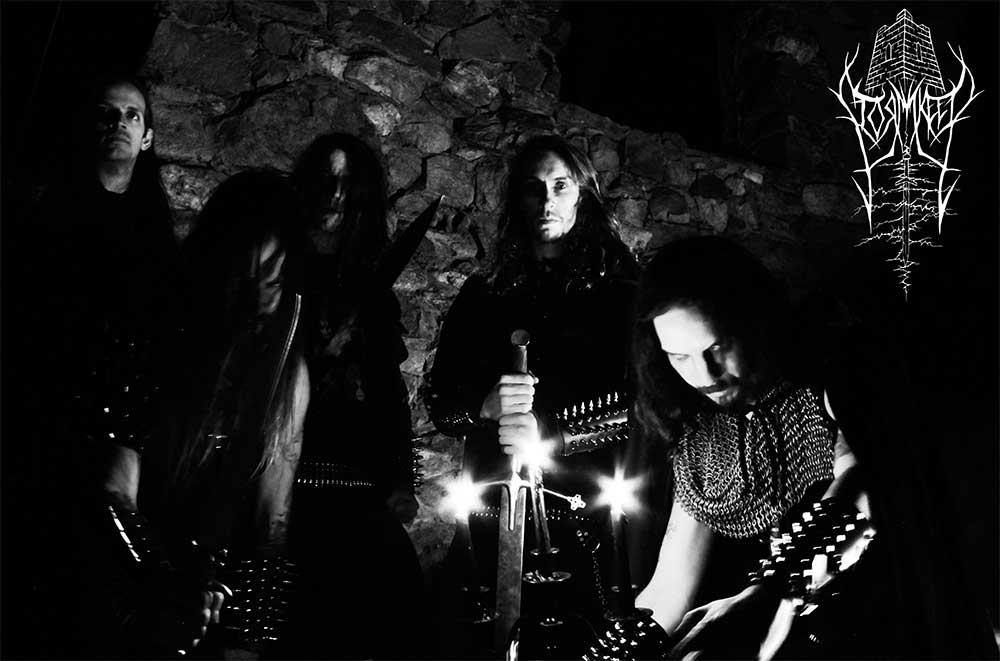Stormkeep
2020-12-16
by Niklas Göransson
Ancient worlds remain – Stormkeep is an American black metal band dedicated to fusing imagination with inspiration. Founder and frontman Otheyn Vermithrax speaks of exploring realms both within and without.
– The seeds of what became STORMKEEP were planted many years ago; my earliest forays into music were associated with the same style this project is so deeply rooted in. However, it wasn’t until 2017 that the band coalesced into something tangible. From the very beginning, this outlet has been about channelling a specific idea. Ultimately, it’s derived from nostalgia – not just for a certain era of metal, but also a time and place which doesn’t exist here in our realm. That being said, it’s also an expression of adoration for a particular musical niche which so perfectly accompanies the themes and stories I wish to portray: the black metal of the mid-90s.
The first documented traces of STORMKEEP is a rehearsal cassette – the rather unremarkably titled “Promotional Tape MMXVIII” – released through the band’s own operation, Order of the Divine Light, in December 2018.
– The promo tape was, in a way, somewhat of an after-thought – a release meant to capture the earliest intentions of this project. Whilst preparing for our mini-LP, “Galdrum”, we made multiple rehearsal demos with minimal overdubs. Once we’d finished the studio recording, I believed it would be sensible to create a preview that encapsulated the spirit and energy of those rehearsals. The art and title were directly inspired by the demo of an important and, in my mind, underrated Norwegian band.
The recording process of “Galdrum” appears to have been heavily catered towards atmosphere; I’m told all instruments were tracked in a candlelit house in the mountains during a raging snowstorm. Otheyn then recorded his vocals in the desolate ruins of a silver-mining town.
– We secluded ourselves at our friends’ home – which also serves as headquarters for the band VELNIAS – up in Nederland, a small town in the mountains of Boulder. There also happened to be a massive blizzard during this time, so I ended up having to stay a few extra days. Trapped, in a sense, which was the perfect scenario to record this music. The vocals were tracked in Caribou, a small settlement west of Nederland that burned down in 1879. What remains are the stone foundations and walls of a few buildings – all structures have missing rooftops and doors and are essentially in complete ruin. This is where the main vocals were recorded, using a portable eight-tracker with only the stone walls as protection from the howling winds and flurries of snow.
“Galdrum” was released by Ván Records in November 2020 – more than two years after the recording.
– The process by which “Galdrum” came to be was rather lengthy, for a number of reasons. The mixing began in the fall of 2018; however, this process took a great deal more time than anticipated. Added to that I believed this recording deserved a proper release, as opposed to just a self-issued tape, and finding the right label turned out to be difficult. Since the band’s very inception, it was clear that every aspect had to be carefully and meticulously manifested. As such, significant time and efforts went into the artwork, layout and general presentation. Since there was no immediate need to release anything – basically, no one outside of our circle even knew about it – we felt no pressure to finish it within a specific timeframe. This allowed us to comb through everything and bring it up to our specific standards. In the meantime, we performed two concerts: one at a secret location in Colorado, to our close inner circle, and another at Fire in the Mountains.

STORMKEEP have no social media pages, no website, and were only recently added to Metal Archives. Otheyn appears to be wholeheartedly dedicated to this project, so I’m guessing the lack of online presence is not out of sheer laziness.
– This is completely intentional. We are committed to creating a specific experience. Perhaps it’s just nostalgia, but I believe there was something more to discovering new music before the advents of technology made finding new bands so easy it lost the very thing that made it special in the first place. Having the ability to listen to any conceivable music composition or learn everything about a piece of art at the tip of our finger does not make people appreciate it more; I would argue it makes them appreciate it less. So, while it’s up to the individual to discover us among the mass of other media that’s available, we try to facilitate a more unique listening experience by detaching it from some of the mundane modern fodder. The listeners should come to their own understanding of STORMKEEP and our music outside their usual parameters.
Since there wasn’t much reading material available, I browsed through a number of YouTube comments and forum posts discussing “Galdrum”. I was struck by how far-ranging people’s comparisons to other bands were. Many refer to the likes of early SATYRICON and ABIGOR, who sound nothing alike in terms of metal but share a very distinct vibe: the medieval-leaning atmosphere which was highly prevalent in mid-90s black metal. For instance, it can be sensed in releases as musically diverse as the early output of both ULVER and VELES.
– In a way, I believe these reactions confirm that I succeeded in my goals. STORMKEEP is not merely an homage to one singular band, it draws on a wealth of material from a range of influences – musical and otherwise. There are not many contemporary artists catering to that specific sound, which is why I felt compelled to build this conduit. Ultimately, I only create music I myself wish to hear and, in my mind, there was no band that straddled all of the worlds I sought to intertwine. There is a proverbial pot where all of these things mesh together and take shape as elements of what STORMKEEP has become. This project and all that emerges out of it are filtered through our shared influences. The intention is to preserve the very essence and element of a far-away land beyond time; something which feels like our past but is, at the same time, strictly out of legend. That requires a specific sonic palate. Inevitably, it turned into something completely different than I could have imagined and has since taken on a life of its own.
Were you listening to this sub-genre during its golden era, or did you work your way back through black metal history?
– I did not discover black metal until it had reached its commercial zenith during the early 2000s. My first introduction was through the Norwegian bands of the early 90s, and that sound immediately struck a chord with me. I grew up next to mountains and forests and spent a great deal of time away from the modern world. In this music, I found something unique to nature: the grandiosity felt after one has hiked through the mountains and ended up staring across a valley untouched by humanity. That particular feeling stuck with me throughout my entire life. This music is what’s always carried my mind to other places and inspired me the most, so it was inevitable that I’d eventually create a platform to express my own interpretation.

Search engine investigation yielded no explanation, but Otheyn told me that ‘galdrum’ is an Old English term for ‘songs of magick’. I suspect this has an etymological connection to ‘galdr’ – a Scandinavian word for old Norse sorcery performed by howling at the top of one’s lungs.
– Yes, it has the same root. The Old English word is ‘galdor’, which means a spell, song, or divination. When made plural, it’s ‘galdrum’. The idea being that music itself is magick. An enchantment or incantation often has the same rhythm and tone as a song; furthermore, altering consciousness through sound has been the work of shamans all across the earth for millennia. It’s one of the only expressions which can convey so much and impart a distinct set of thoughts and emotions, even transport the listener to an alternate reality: all through the usage of sound. In this way I felt the title was apt, seeing as how these songs – while each deal with a different story – are all centred on another world.
The lyrics for “Galdrum” play out in ‘Othertime’, which is a fictional universe of Otheyn‘s own design.
– This is a world that’s been revealed to me over the past few years; it’s taken shape side by side with STORMKEEP and our music. Othertime can perhaps be best understood as the medieval world as those living in it themselves saw it: filled with mythical beasts, magick and evil forces beyond our knowledge. Othertime began as just a location for unrelated stories for the first few songs we composed, but has since evolved into a living, breathing history. As the scope grows larger, it has become a mapped-out setting for fully-formed narratives, timelines, and plots – all of which will make up future material. This world is integral to the band’s essence, and those of us in the STORMKEEP are tied to and residents of Othertime. Each piece is meant to take the listener into this realm and awaken their imagination.
Are you trying to instil some sense of escapism from modern reality, or something like a musical journey meant to inspire real life?
– I suppose it’s a combination of both. This music comes out of a longing for something that doesn’t exactly exist in strict terms. However, what is so unreal about our imaginations? In the time we’re speaking now, we live in a world mired by contested truth. We live in a place of such absolutism that it’s pushed us into superstition once again. Our imaginations rule over us. It’s in our minds we create our identity – our own story about who we are and why we do the things we do. This power can be harnessed; it can be made malleable and driven towards whatever we desire. That is magick. What propelled me to create this other world has also created me. The role of fantasy in its purest sense is escapism: nostalgia for another time, a feeling of wanting to be elsewhere… I think a lot of great art comes from this place. I have a dissatisfaction with the present reality and the way modern man lives. This music is escapism for me, but also a meditation on the things that bring me satisfaction. In Othertime I can dwell and live many aeons in mere moments.
Otheyn explains that although the lyrics are fictional in the immediate sense, there’s still an element of genuine mysticism – meaning, one does not have to take the words literally to be serious about the concept.
– The subject matter is of importance and not merely a case of throwing themes together: the lyrics and ideas come from a very specific place. I’ve heard many artists and writers say something to this effect – not being completely responsible for their own creations, that there’s something beyond calling to us. It has been my own experience that much of what I create comes from somewhere else. Some might call it the Muse, but there’s another element at play I cannot rationalise. Therefore, there is a reverence for the content created as it contains something from the other side of the abyss. This act of creation is really what many call magick. So, when I talk about sorcery or magicians, it comes from an understanding that the world itself is a mysterious and magickal place that contains multitudes beyond our human understanding; out of that, stories can be told of a place where such forces thrive.

Extreme metal featuring medieval and sword-and-sorcery oriented themes has obviously remained a permanent fixture ever since it first appeared; the main difference is that most such prominent modern acts use them in a tongue-in-cheek fashion. I would speculate this to be a symptom of an insufferable tendency of the modern mind – where people in their twenties, thirties, and even forties are incapable of relating to anything metaphysical and solemn without lapsing into sarcasm and irony.
– Absolutely, people of today have a difficult time engaging with anything seriously. This is because they are constantly fed sardonic and vapid media that’s only surface-level and superficial. Because of what’s expected of the masses, it seems as though subtext, nuance and deeper meaning get thrown aside and end up serving the lowest common denominator. At the same time, I would be remiss if I didn’t acknowledge that much of metal music is inherently kitsch and has that over-the-top quality laced throughout its DNA. Nonetheless, it’s fully possible to acknowledge this and simultaneously take one’s own work seriously; I think we straddle that fine edge comfortably.
I’m reminded of something the bass player of legendary Swedish band MORBID, Dr. Schitz, who is a psychologist these days, said about black metal: ’Note that contemporary Western society is the only culture anywhere in the world, at any time, that neither believes in spirits nor has ways of relating to them. Thus – in this secular world – it’s remarkable to find a sub-culture with such heavy emphasis on magic and the divine.’
– That sums it up pretty well. Black metal has maintained a certain place in music as something totally unique and different from other subgenres because of its innate need to explore realms beyond our understanding – into some of the darkest and less examined places. It’s a direct challenge to the malaise of modernity – the flat, calculated sterility of science. Music in general requires the listener to engage on a level which is not wholly rational; it considers an energetic and emotional response that cannot be explained through metrics.
In closing, I read that a debut album is ‘imminent’ – how far into this process are you now?
– Since it took two years for “Galdrum” to surface, we’ve had quite a bit of time to write more material. Consequently, an entire full-length LP has been composed and arranged; we are now in the earliest phases of this release, but I believe it will be revealed in a much swifter fashion than its predecessor. Future recordings will deal more with that personal ordeal of facing the perils of life as a human being surrounded by malevolent energies. The Hero’s Journey is itself the re-telling of that story: the transformation of a person into their highest self, through trials and tribulations. That is the basis all mythology spawns from. Othertime and STORMKEEP will become methods of transmuting that singular story into a specific framework. Additionally, the music itself is just as important as the lyrics and narratives. Every aspect of the music is crafted to carry the listener away for just a short amount of time, and if that can impart a small change to their psyche or elevate them in some way – even better.



